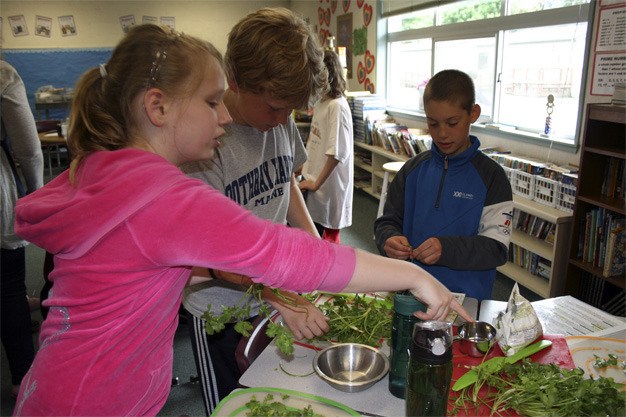Fourth grade is not too early to learn that what you eat now will directly affect the rest of your life.
On June 1, Bill Marsh, from the Beecher’s Flagship Foundation, brought the foundation’s Pure Food Kids Workshop to Lakeridge Elementary School. Marsh taught for the last 15 years at Eastside Catholic High School, with his final 10 years as the associate athletic director and head football coach. Marsh is now an assistant coach at Mercer Island High School, in addition to his work with the foundation.
Marsh definitely has a way with kids. First, a short lecture on how foods are marketed caught the kids’ attention.
“Who are the most powerful people in the world?” he asked the class. “You are!”
Indeed, when it comes to marketing food to kids, “eye-catchers” make them want a product within one second, he said. Holding up a box of Special K bars, he asks what they see first. Well, there’s the big “K” they’ve all seen before, an appealing picture showing the strawberries in the bars and the disclaimer that you can lose several pounds in weeks — so it must be good, right? Who will this product appeal to?
“It’s all woman-y,” said Max Samson, deciding that this product is definitely being marketed to women.
The class was divided into groups with each given a product to dissect nutritionally.
Aliya Chin’s group had the snack food called Gushers.
“In the corner it says it’s a good source of vitamin C,” she said.
Her group decides Gushers are being marketed to kids; they are not convinced they are very good for them. Chin also noticed the word “new” on the box, and said that always catches her eye.
“We went through the ingredients and saw a lot of chemicals,” said Elaina Martin, of the Gusher group.
The realization of what is in some of these processed foods surprised the kids. As they read the list of ingredients in the various products, they didn’t know what a lot of it is — but then, most people don’t.
The revelation that the energy drink, Monster, contains 54 grams of sugar, was a real shock. Marsh said that a fourth-grader should only consume 12-14 grams of sugar in a day. Many of the kids admitted to drinking an energy drink.
The conversation turned to whole foods v. processed foods. Marsh showed the students how to read nutrition labels and to note the serving size. He schooled them on bad fats, pointing out that trans fats and hydrogenated fats are the same thing. Often a product will proclaim “no trans fats” on the label, but the tiny print of ingredients will list hydrogenated fat.
A discussion on fiber had the class in stitches as Marsh told them in no uncertain terms why fiber is good for them.
“So when grandma says to eat your fiber, do it,” he said.
The class culminated with everyone pitching in to make an all-natural vegetarian chili. Niah Johnson read the ingredients in a popular canned chili, tripping over some of the chemical names. Then she read the ingredients in what they were about to prepare — pretty simple — olive oil, bell peppers, garlic, beans, cilantro, onion, spices; real food.
With each group assigned a task, within eight minutes the chili was cooking, filling the room with a yummy aroma.
Marsh wrapped things up by pointing out to the kids that excess sugars contribute to obesity and type II diabetes.
Kurt Beecher Dammeier, of Mercer Island, founded the Beecher’s Flagship Foundation in 2004, receiving 501c3 status in 2007. In its sixth year, the Beecher’s Flagship Foundation’s Pure Food Kids Workshop is a program aimed to help “change the way America eats” by empowering kids with the knowledge to make their own healthy eating choices.
The Pure Food Kids Workshop has served over 20,000 students, teachers and volunteers since its beginning and will serve another 8,000 this year.
Over 350 schools throughout Washington, Oregon and New York have participated in the workshop with 95 percent of teachers asking the foundation to return the following year.
After the workshops, 94 percent of kids retain the knowledge after four weeks, and 85 percent of kids make improvements to their eating habits. The workshops also have an effect on parents. Forty-five percent of parents pay more attention to product labeling as a result of their child’s participation in the workshop, and 60 percent report improvement in grocery shopping habits.


